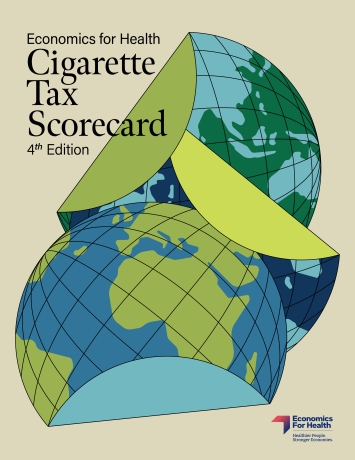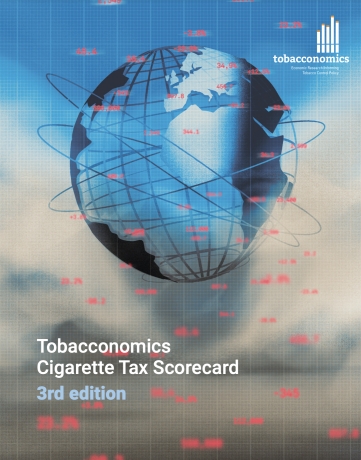
Press Release: Fourth Cigarette Tax Scorecard Shows Limited Progress, Substantial Opportunity for Governments
The fourth edition of the Economics for Health Cigarette Tax Scorecard (formerly released under “Tobacconomics”) is out today, December 15, 2025, and shows that most governments are not implementing best practices in tobacco taxation. Tobacco use is one of the leading causes of preventable death, and tobacco taxes remain the most effective, yet under-utilized, tools to reduce consumption and raise tax revenues. Read MoreTobacco Tax Increases Around the World– Summer 2025 Update
Thus far, 2025 has been a challenging year for governments fiscally, with economic instability and budgetary shortfalls experienced around the world, most notably to support health and education programs. Health taxes—and especially tobacco taxes—provide an opportunity for policy makers to improve the health of the population, as well as to raise much-needed revenues. Decades of evidence demonstrate the untapped potential of effective tobacco taxes for countries relative to current best practices. High taxes and a simple tax structure, along with regular adjustments to outpace the combination of inflation and real income growth, will reduce affordability over time, discourage tobacco consumption and decrease the burden of tobacco-related disease. Read More
Do Cigarette Tax Hikes Increase the Illegal Market? Brazil's Data Says No
Increasing tobacco taxes is the single most effective and cost-effective tool to reduce smoking, reduce health care costs, and increase government excise tax revenues. Despite considerable evidence supporting higher tobacco excise taxes, policy makers–particularly in low- and middle-income countries–have been slow to adopt such taxes. This failure is largely driven by concerns about potential negative economic repercussions from tax increases, often perpetuated by the tobacco industry. Read More
Developments in the Western Balkans Signal Crucial Progress in Tobacco Control in the Region
Economics for Health began working with think tanks in the Western Balkans back in 2018, (under our previous name, “Tobacconomics”). Since then, we have explored the economics of tobacco control and especially tobacco taxes across the region and shared these results with decision makers and other stakeholders. As this evidence base grew, we are excited to see more and more excitement about tobacco taxes from policy makers. Read MorePress Release: Leading Think Tank on Health Impacts of Fiscal Policies Rebrands as Economics for Health
The following is a statement by Dr. Jeffrey Drope, Director of Economics for Health. Read MoreTobacco Control Community Unites to Protect Youth: World No Tobacco Day 2024
On World No Tobacco Day 2024, we are joining the tobacco control community and sounding warning bells about the concerning trends in youth smoking around the world. Surveys from around the world show that youth tobacco prevalence is either increasing or staying the same in nearly half of countries where recent data are available (learn more in the Tobacco Atlas Youth chapter). These findings underscore the need to strengthen efforts to deter youth from initiating use. Read More
New Tobacconomics Cigarette Tax Scorecard Reveals Lack of Progress on Tobacco Taxes
The third edition of the Tobacconomics Cigarette Tax Scorecard is out today, with troubling results for the tobacco control community. Governments have made insufficient progress in addressing one of the world’s leading causes of preventable death: tobacco use. Read MorePakistan’s Fiscal and Public Health Success with Higher Tobacco Taxes in 2022-23
Pakistan's Federal Excise Duty on cigarettes operates on a two-tiered specific system based on price— low and high. In the 2022-23 fiscal year, the government demonstrated its commitment to reducing cigarette consumption in Pakistan by significantly increasing excise tax rates on cigarettes in both tiers. This led to the excise tax share in retail price—a good marker of effectiveness—reaching 48% and 68% for the low and high tiers, respectively. The printed price of the most sold brand, Capston, rose from PKR 97.50 in July 2022 to PKR 210.76 in July 2023, and annual production dropped by about 28%, marking a significant victory for public health in the country. Less production indicates less consumption suggesting that many smokers quit and many young people did not start because of the higher prices. Read More
